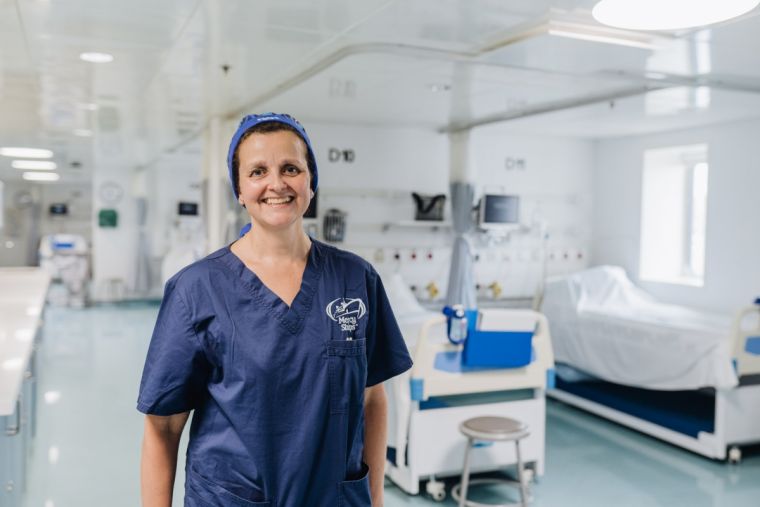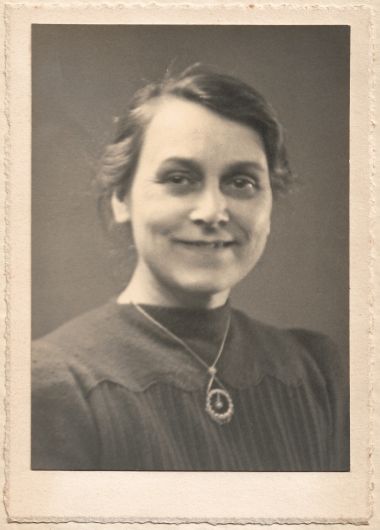Following in the footsteps of my trailblazing medical missionary grandmother

Around 100 years ago, Rachel Buckingham's grandmother became a doctor at a time when some universities in the UK still barred women from qualifying as physicians.
Little did Dr Alice Muriel Griffiths from Cardiff, Wales, know that she would inspire her descendants to combine medicine and faith as she headed off to India as a missionary to treat patients with leprosy in the 1920s.
Muriel, as she preferred to be called, belonged to a remarkable family in the history of the Baptist movement in Wales. The Griffiths family has generations of ministers who went on to work in Wales, England and even the USA.
Today, her granddaughter Rachel, also a devout Christian, is the lead orthopaedic surgeon volunteering for Christian charity Mercy Ships onboard the world's first purpose-built civilian hospital ship – the Global Mercy.
Earlier this month, she performed the first-ever surgery in one of the brand-new state-of-the-art operating theatres on the ship docked in Senegal, West Africa, for the next five months.
Rachel, who has been Consultant Paediatric Orthopaedic Surgeon at the Oxford University Hospitals Trust since 2007, said: "My grandmother was a doctor and a trailblazer. In the 1920s she went off as an unmarried woman to India as a medical missionary.
"It was she who inspired me. My father, another inspiration, was also a surgeon. But hearing what she did, including her work with leprosy patients, made me decide, aged 10, that I wanted to study medicine. And I did not want to do anything else from then on!"
Muriel was one of the first women to graduate in medicine at the Royal Free Medical School in London, before heading to India where she cared for those who were sick and met another Baptist, the Rev Frank Fellows, who had been there since 1915.

The pair married and spent much of the next 20-plus years there where Muriel travelled to the homes of those who needed medical help as well as holding daily surgeries outside their home.
They moved in 1931 to Cuttack, in the east of India, where Rev Fellows became the Principal of the Theological College and Muriel cared for lepers at the nearby lepers' hospital. Through her efforts, a chapel was built at the hospital and it became a centre for Christian social work and outreach.
She was known for electrifying the Welsh Baptist Union with her talks.
Sadly, Rachel's grandmother died in 1977 when Rachel was still young, but her formidable spirt left a mark on her.
First surgery
Fast forward to 2023, and Rachel is part of an historic moment herself, as she performs the first surgery onboard a ship which is expected to transform more than 150,000 lives through surgery alone during its 50-year lifespan.
In addition, thousands of African medical professionals will receive training and mentoring with the goal of multiplying impact within their communities.
While mother-of-three Rachel performs her surgeries, she will be training an African orthopaedic surgeon alongside her, who (despite being from Morocco originally,) is committed to staying in Senegal to treat the Senegalese people.
Rachel, 55, said: "Senegal has not got a paediatric orthopaedic surgeon. I am hopeful he will be their first."
Rachel and her husband Rob, a professor and robotics engineer, were determined to volunteer for Mercy Ships since first visiting one of its ships while it was docked at Bristol.
Rachel said: "We visited and had a tour of the Anastasis. We were running a church youth group at that time and we took some of the kids to show them. Mercy Ships had been on my mind but we were both busy with work. Once the children were growing up and leaving, I decided to apply."
They first got the opportunity in 2019. Rob volunteered in the dining room while Rachel went into paediatric orthopaedic surgical care.
Stark differences
Rachel said: "Coming out here you notice some stark differences. The lack of surgical care people have here. We treat children with such severe deformities because they would never be able to get to that point at home - we would have treated them in early life. People are just so grateful for the chance to get surgery.
"We are incredibly lucky to have the NHS. Whatever problems our NHS has – it's amazing. People can walk in and get free medical care and we should never take that for granted. And we have so many doctors."
In sub-Saharan Africa, nine out of 10 people have no access to safe surgery and Rachel said the need is critically obvious.
"What keeps me coming back is the need. It's the ability to train local healthcare workers and make a difference.
"Mercy Ships really wants to do itself out of a job. You go into medicine to have an impact, so here we have a massive impact.
"Mercy Ships is a breath of fresh air. It is so professional. People come from all over the world who are properly trained and vetted, and you see an incredible can-do attitude to work together to change lives."
Trailblazing
Just as Rachel's grandmother combined her faith and medicine in a male-dominated background, Rachel still encounters some similarities.
Rachel said the lack of females in senior positions during her medical training never held her back – if anything it made her more determined.
"As a junior doctor I never worked for a woman – so I never had a role model in surgery. Orthopaedics is very male-dominated, and I found that some men felt they had to be a very stereotypical surgeon. But for me it was liberating being a woman as I found my own way. I am me."
Just as her grandmother did, Rachel's determination and courage is seeing her change the lives of those in urgent need.
If you are interested in transforming lives like Rachel, visit here for more information.











